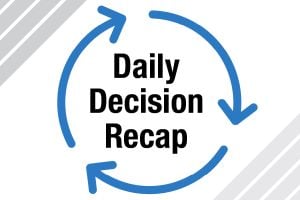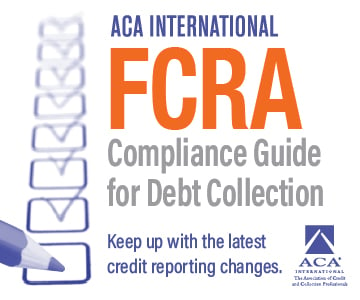 The report largely focuses on credit reporting and credit card account management over debt collection and student loan servicing. The CFPB exam results can be a tool for your compliance evaluations.
The report largely focuses on credit reporting and credit card account management over debt collection and student loan servicing. The CFPB exam results can be a tool for your compliance evaluations.
05/03/2022 3:15 P.M.
3 minute read
Key Takeaways
- The report can serve as a tool to help you and your agency evaluate compliance processes.
- The CFPB conducted several exams related to credit reporting, making the topic a significant focus in the report.
- There were minimal findings from investigations related to debt collection and student loan servicing.
—
The Consumer Financial Protection Bureau has released its latest supervisory highlights report for examinations of regulated companies between July and December 2021.
Takeaways from the report can serve as another tool to help you and your agency evaluate compliance processes.
The findings included in this report cover examinations in auto servicing, consumer reporting, credit card account management, debt collection, deposits, mortgage origination, prepaid accounts, remittances and student loan servicing.
According to the CFPB, the report can help companies and consumers better understand how the bureau examines institutions for compliance with federal consumer financial laws.
“When CFPB examiners uncover problems, they share their findings with companies to help them remediate the violations. Typically, companies take actions to fix problems identified in examinations,” the CFPB reports. “For more serious violations or when companies fail to correct violations, the CFPB opens investigations for potential enforcement actions.”
Now that we’ve covered the basics of these semiannual reports, here are a few highlights you need to know:
Debt Collection and Student Loan Servicing
Examinations of agencies in the consumer debt collection market showed risks of violations of the Fair Debt Collection Practices Act.
The report includes just two examinations on debt collection. In the first exam, the CFPB found collectors were misrepresenting or implying to consumers that they owed debts that were the result of identity theft or other fraud-related activity. The debt collectors issued refunds of the consumer payments.
In another debt collection exam, the CFPB found multiple instances “in which debt collectors may have engaged in an unfair act or practice in connection with the collection of a debt by failing to timely refund overpayments and credit balances to consumers,” according to the report. The debt collectors will report their solutions to the CFPB, including refunds to consumers and editing policies and procedures.
For student loans, the bureau’s exams focused on private student loan servicers.
In one exam, it found the servicer did not “provide early repayment incentive payments, referral bonuses, and welcome bonuses due to system errors.”
The servicer added monitoring systems with new weekly reports to ensure consumers received the correct refunds.
After another servicer provided new payment agreements with consumers in response to the COVID-19 pandemic, the CFPB found they did not follow through on the agreement.
Consumers made payments on their student loans that were not due under the new schedule. The student loan servicer issued refunds to remedy the issue.
“This practice caused or was likely to cause substantial injury to consumers because they lost the use of money that should have been refunded,” the CFPB reports.
Credit Reporting
The CFPB conducted several exams related to credit reporting, making the topic a significant focus in the report.
The CFPB released a report in March about the U.S. medical billing system and the credit reporting infrastructure connected to medical debt, ACA International previously reported for members.
Exams highlighted in the report include:
- Review of consumers’ disputed information on their credit report.
- Notice of consumers’ dispute to a data furnisher.
- Written notice of the results of a dispute within five days of reviewing the matter.
- Create and use reasonable policies and procedures on keeping accurate information on consumers’ credit.
ACA’s Take:
Accounts receivable management industry companies can use the bureau’s semiannual supervisory highlights reports to measure compliance standards with regard to the bureau’s enforcement of federal consumer financial laws and to help limit risks to consumers.
If you have executive leadership updates or other member news to share with ACA, contact our communications department at [email protected]. View our publications page for more information and our news submission guidelines here.
 The report largely focuses on credit reporting and credit card account management over debt collection and student loan servicing. The CFPB exam results can be a tool for your compliance evaluations.
The report largely focuses on credit reporting and credit card account management over debt collection and student loan servicing. The CFPB exam results can be a tool for your compliance evaluations.













